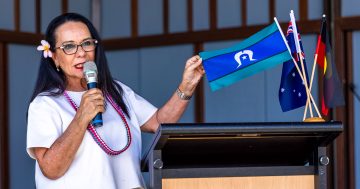
Social Services Minister Amanda Rishworth: unpaid carers frequently face obstacles in securing work and settling into the workplace. Photo: ALP.
Unpaid carers are finding it hard to get jobs, but the government and Carers Australia are trying to do something about it.
And employers will be encouraged to pitch in as well.
As part of National Carers Week, the Federal Government has announced a new program to address hurdles unpaid carers face in the workplace.
Social Services Minister Amanda Rishworth unveiled the Carer Inclusive Workplace Initiative at Parliament House Thursday morning (19 October), saying it resulted from recommendations from the Government’s Jobs and Skills Summit held last year.
The initiative aims to promote equal opportunities and reduce barriers to employment.
“Australia’s ageing population, cost of living pressures, and evolving lifestyles are reshaping the landscape of caregiving,” Ms Rishworth said.
“Just as workplaces have adapted to accommodate parents caring for children, it is crucial that we acknowledge the unique challenges faced by carers and provide them with the support needed to thrive in their careers.”
The initiative seeks to highlight and support the importance of recognising the invaluable contributions of carers and their role in society.
She pointed out that unpaid carers frequently face obstacles in securing work and settling into the workplace.
Carers Australia will take carriage of the initiative. The peak body used the launch to welcome a strong government commitment to career inclusivity.
Chief executive officer Jane Bacot-Kilpatrick said Australia’s workplaces needed to become more inclusive for the 2.65 million unpaid carers within the community.
“Unpaid carers frequently face barriers in the workplace. This initiative aims to directly address this by giving organisations a framework to build a carer-inclusive workplace,” she said.
“We encourage all employers, no matter how many people they employ, to sign up and support the individuals who selflessly provide unpaid care within our communities.
“Organisations that undertake this commitment will not only contribute to a more compassionate society but also gain a competitive edge by attracting a broader pool of talented employees.”
The cornerstone of the initiative is the introduction of a carer-friendly workplace framework, which includes a self-assessment tool and e-learning modules designed to guide businesses in becoming more carer-friendly.
Employers will be encouraged to evaluate the inclusivity of their workplaces through an online assessment and use the insights gained to build policies that better understand and support carers in their workplaces.
Workplaces scoring highly in the self-assessment will be deemed ‘committed to carer inclusivity’.
Such organisations that excel in the self-assessment process will be awarded a distinctive brand mark to showcase their commitment to supporting carers on recruiting platforms.
Participating organisations will have access to a virtual hub, providing an array of resources, templates and quick reference guides to empower employers to make meaningful changes that accommodate the unique needs of carers.
The 2023 Carer Well-being Survey underscored the challenges carers face in the workforce.
Almost two-thirds of all carers (63.9 per cent) reported low satisfaction with their ability to participate in paid work.
The survey also revealed that 50 per cent of carers indicated their ability to participate in paid work was getting worse but highlighted a direct correlation between supportive employers and healthy levels of well-being.
Of those with understanding employers, 52.9 per cent had low well-being, compared to 70.9 per cent of those who felt their employer was not understanding.
Carers Australia data shows that embracing a carer-inclusive workplace can reduce stress and anxiety by decreasing conflicts between work and family commitments.
It also improves an organisation’s reputation and brand image by demonstrating an understanding of diversity.
Such workplaces also enjoy enhanced attraction and retention of employees and open up additional talent pools.
Original Article published by Chris Johnson on Riotact.










